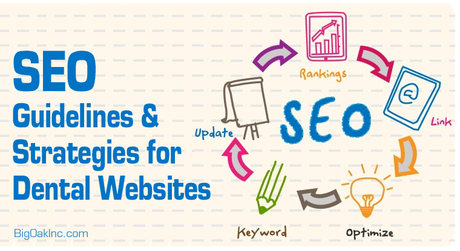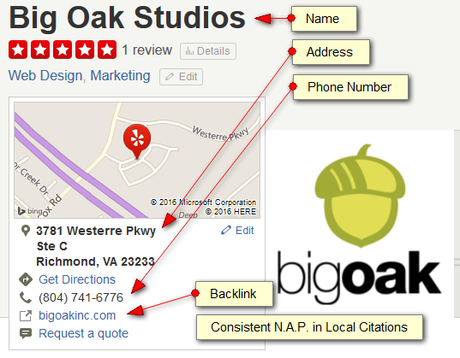Every business struggles, to some degree, to find or attract new clients and this can be even more challenging for a dentist office in today's world. There is a lot of competition and sometimes you are in a small market with established dental practices who may already be dominating the the organic search results. What is a new office, or a dentist new to Internet marketing, to do? Well, it isn't hopeless, but it will require some time and effort to achieve rankings which will provide a stream of new clients to your dental practice. We can give you the honest truth and our strategy for Dental SEO Marketing online. We offer this specialized service; see our page for dental SEO services.

If you're like many dentists and dental practices, you probably get dozens of emails every month making claims that they can rank your site at the top of Google. And the reason you don't reply is they are making promises to good to be true and you know it. If you feel this is too much for your office to handle, we welcome speaking with you about how we can help. You can call me ( Shell Harris) directly at 804-741-6776 x 100. I am one of the founders of Big Oak Studios, Inc., and we have been providing SEO and PPC support for our clients since 2004.
Here are our best SEO tips to increase your organic rankings. These SEO best practices will increase your website traffic and expand the number of dental client leads you receive through phone calls and email. You can get started today on driving new patients to your dentist office website.
Optimize Your Dental Website
This should be your first task when trying to increase your Google rankings for your dental practice site. Page titles, headings, subheadings and content should all be evaluated and then optimized. One thing to note, what are considered the best optimization techniques today, can change based on Google's algorithm at any given time. Of course, there are tried and true optimization guidelines to follow, such as including keyword phrases that are relative to each page and making sure each page is focused on one topic. For example, having one page talk about all your services such as teeth whitening, crowns, veneers and so on is a bad idea. Each topic or subject should have its own page and should be optimized accordingly.
Some other quick hits for best practices in website optimization:- Your dental website's content and HTML code needs to be easy for search engines to find and index.
- Your content must be focused and establish your office as an authority in the dental industry in your area.
- Include your real address and phone number across your dentist site.
- Use photos that are from your office, when possible, and include alt tags to describe them.
- Your offsite SEO factors such as backlinks and social media listings should provide authority and trust that Google can apply to your site and give you better organic rankings for.
Have a Content Marketing Strategy and Blog Often

This blog content lets you target keyword phrases other than the standard "Dentist + City" or "City + Dentist" search. Those keyword phrases are best left to your home page. Your blog posts can target longer phrases that address your patients questions and concerns. Blog posts focusing on "long-tail" keyword phrases (e.g., what does a root canal feel like) have less competition and higher conversions. Of course you want to include your main keyword phrases, but your blog posts give you so many more options.
We like to create tent-pole blog posts. These posts provide traffic that supports your site and should bring in new leads and new patients to your dental practice. Writing blog content that is well-researched and has depth is the focus. You want to show your expertise to the reader who could be your patient tomorrow. These posts are lead generators and provide a great foundation for attracting traffic that converts.
Of course, saying or writing this is easy, but finding the time and the right topics can be difficult. Do you have the time to write about the topics that bring search traffic to your site on a regular basis? If not, you need to hire a writer who does. You can always contact us to help. But someone must write and write consistently. It builds your site, shows your knowledge of the subject, and demonstrates why you are the best dentist in the area. Here are some examples that target what your potential dental patients may be searching for:
- Warning Signs of Impacted Wisdom Teeth
- TMJ Problems and How You Can Prevent Them
- What toothpaste should you buy?
These are actual questions that people are searching for. If you write about it (or hire us) then your site can provide the answer and now you have a higher chance of the reader contacting your office if they need help. Addressing the problems your patients have should be the focus of your blog posts. Think of your blog as an FAQ page...on steroids. Lots of helpful advice for those suffering or with questions.
Fixing Citations in Directories and Social Sites

It can be even worse if you have moved and have different addresses across the Internet. You should also be concerned if you have a phone number that has changed. Your main phone number should be identical, so old numbers need to be updated along with your true business name and address. Your N.A.P. ( name, address, phone number profile) should be the same everywhere it is found. This can take many hours to find and update your listings and weeks or months before the correct results are updated across the Internet.
Big Oak specializes in making sure your N.A.P. is the same which provides important data to the ranking algorithm within Google. It is a critical component for Google listings, and is necessary to ensure your practice is show when searches are being done for a dentist office by potential patients in your area.
Using Social Media (Facebook and Google My Business)
Social media isn't a cure-all and it can be pushy when used incorrectly, but making sure you have an active and up-to-date Facebook page and Google My Business page (also known as Google Places, Google Local and Google+) is an easy thing to do and will help with local search results.
At Big Oak Studios, we feel your blog posts are important to feeding your social sites. All blog posts should be on Facebook and your Google My Business page. Both of these social sites provide authority and citations to help rank your site and provide better local listings. This builds inbound links from two sites that Google loves and trusts.
This provides higher rankings and gives you more exposure in Facebook for users who may look for a dentist while on Facebook as well as providing feedback (if you use Facebook star rankings).
Reviews are Important for Online Marketing
Sharing experiences is human nature. Unfortunately we are more likely to share a bad experience more than a positive experience. This can lead to a number of negative reviews, even if you have many happy patients. If you don't have this problem, that's great for your business. But if you do, this requires some work; contacting your happy patients and asking for positive reviews. In either case, you should be monitoring these, especially within the Google search results. Always ask patients for reviews. If you have 20 or 200 you should keep asking. The more, the better.
When you are trying to attract patients, then every good review is worth the time and effort it takes to acquire it, especially if you are fighting a number of negative reviews. We can coordinate a campaign that targets getting positive reviews (and helping your patients know where to post them).
 Make Sure Your Dental Website is Mobile Friendly (Responsive Design)
Make Sure Your Dental Website is Mobile Friendly (Responsive Design)

At Big Oak Studios, we make sure all sites we build are mobile friendly and have a responsive design. This is essential as Google has made the statement that having a mobile-friendly site will affect rankings. With 50% or more searches coming from mobile devices, it is more important than ever to make sure your site displays correctly for visitors using a cell phone or tablet. We can help move your site to a mobile-friendly platform if it hasn't been modified.
The added benefit of making sure your phone number is clickable should not be overlooked. Your number to your dentist office can be right at the top and just a click away for someone to call.
If you have a dental website that needs SEO help, but you don't have the time or staff, please consider giving Big Oak Studios a call. You can ask for me, Shell Harris. My direct phone number is 804-741-6776 x 100. We will provide an SEO audit, which includes:- Keyword research and how well you rank already
- Competitor analysis - who is ranking above you and why
- Evaluation of your website, including code and content
- Evaluation of your company's online presence - NAP, backlinks, social media, and mentions of your dental practice

SEO Guidelines and Strategies for Dental Websites by Shell Harris is licensed under a Creative Commons Attribution-ShareAlike 4.0 International License.
Based on a work at http://www.bigoakinc.com/blog/seo-guidelines-strategies-dental-websites/.
